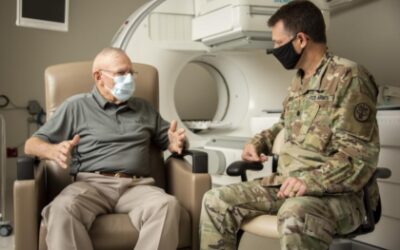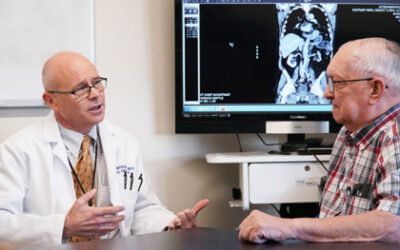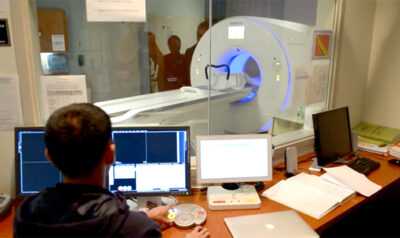Public health officials can better target their message if they better understand where COVID-19 primary and booster vaccine uptake is low. A new VA study suggests that whether the potential recipient lives in a rural or urban area can be an important factor.
New York’s Operation COVID-19 Is Largest Domestic Mobilization in US History
On March 7, 2020, then-Gov. Andrew Cuomo signed Executive Order 202 declaring a state of emergency for the state of New York. Within days, military forces in the state mobilized to respond to the pandemic with the deployment of 270 servicemembers from the New York Army National Guard and Air National Guard to New Rochelle in Westchester County
Survey Examines COVID-19 Vaccination Hesitancy Among U.S. Soldiers
Soldiers who agree with COVID-19 vaccination effectiveness, safety or importance, as well as soldiers who have an immediate supervisor who encourages them to get the COVID-19 vaccine, are more likely to get vaccinated, according to a new study.
More Treatment Failure Risk in Patients on Antidepressants and Montelukast
Montelukast, a prescription drug used to treat and prevent asthma, can affect antidepressant effectiveness, and initiating the asthma medication in patients already receiving antidepressant maintenance therapy is associated with an increased risk for treatment failure, according to a new study.
Intervention Improves COPD Patients’ Access to Pulmonary Care
Exposure to oil well fires, burn pits and sand and dust particles as well as the use of tobacco products puts veterans at increased risk of lung diseases, including chronic obstructive pulmonary disease (COPD).
New VA/DoD Pain Guideline Urges Buprenorphine Use Over Full Agonist Opioids
Recent VA/DoD guidelines call for new measures to reduce the use of opioid pain relievers in the management of chronic pain, including the preferential use of buprenorphine over full agonist opioids.
Five-Year Survival Rate for Late-Stage Prostate Cancer Is Higher Among MHS Beneficiaries Than for the General Population
Prostate cancer is the third-most-common cancer in men in the U.S. military and the second-leading cause of cancer mortality in U.S. men overall.
Tumor Location Increasingly Important for Determining Optimal CRC Treatments
Traditionally, treatment for colon cancer has been based primarily on the stage, but other issues—especially location—are becoming increasingly important.
VA Participated in Research Examining Major, Minor Colonoscopy Risks
Colonoscopies are not without risk, yet data are limited regarding the procedures’ long-term adverse effects.
Colorectal Cancer Screening Has Changed Significantly in Recent Years
In recent years, the protocols for colorectal cancer screening have undergone some significant changes.
Genetic Risk Factors for Alzheimer’s Found for Those of African Ancestry
VA researchers have discovered several new genetic variants associated with Alzheimer’s disease—the most common form of dementia—in people of African ancestry.
VA Employee Sues Over VA’s Decision to Provide Abortion Services
When VA announced in September that it would be allowing department clinicians to provide abortions and abortion counseling in response to the overturning of Roe v. Wade, it was widely anticipated that there would be lawsuits from state governments that restrict abortion access.
Centralized Process Ensures Equitable Distribution of Emergency-Use Authorization Medications in the VHA
Treatments used under emergency-use authorizations (EUA) have led to significant reductions in morbidity and mortality during the COVID-19 pandemic, but ensuring their safe use in the people who could stand to benefit the most from them is a formidable task
Veterans With Parkinson’s Disease at Higher Risk of Suicide
A Parkinson’s Disease (PD) diagnosis has been shown to increase patients’ risk of suicide, according to a new study.
Psychiatric Conditions More Common With Drug-Resistant Epilepsy
It is not uncommon for epilepsy patients to also have psychiatric conditions, according to a new study which used VHA records to better understand the co-morbidity.
Factors Making PTSD More Likely After TBI
Why do some military servicemembers with traumatic brain injury (TBI) develop posttraumatic stress disorder (PTSD) symptoms, while others do not?
What About Servicemembers Discharged for COVID-19 Vaccine Refusal?
DoD officially rescinded the COVID-19 vaccine mandate for servicemembers last month. Even though President Joe Biden and DoD leaders opposed the move
Mental Health Conditions Affect Treatment, Outcomes for HIV Patients
The presence of diagnosed mental health conditions—whose prevalence in people with HIV has grown overall in recent years—can have an important impact on retention in care and viral suppression in HIV patients, a new study shows.
Clozapine Underused in Veterans With Schizophrenia, Schizoaffective Disorder
Although clozapine is the only pharmacologic intervention approved for treating patients with schizophrenia or schizoaffective disorder who have had suicidal behaviors or inadequate response to other antipsychotics, the medication is underutilized in veterans with these mental health issues, according to a new study.
Guided Bronchoscopy for Lung Lesion Diagnosis
Even though guided bronchoscopy is being used more and more to diagnose peripheral pulmonary lesions (PPL), questions continue about the procedure’s diagnostic yield.
Risk Score Measures NSCLC Surgery Quality
The VALCAN-O score, which uses a data set from the VHA, was developed for patients diagnosed with resectable early-stage nonsmall-cell lung cancer (NSCLC).
Novel Treatments Drive Down Lung Cancer Death Rates
The National Lung Screening Trial (NLST), which began at the beginning of the 21st century, compared two ways of detecting lung cancer: low-dose helical computed tomography (CT)—often referred to as spiral CT—and standard chest X-ray.
Identified: Genes Associated With Risk of Suicidal Thoughts in Veterans
Multiple genes linked to an increased risk for suicidal thoughts and behaviors in U.S. military veterans have been identified, according to a new study.
VHA Wait Times Increased Most for Blacks, Hispanics During Early Pandemic
Black and Hispanic veterans appeared to experience more barriers to accessing care than white veterans during the COVID-19 pandemic, according to a new study finding that wait time disparities increased significantly from the pre–COVID-19 period.
With More Than 250,000 Alzheimer’s Patients, VA Is a Market for New Drug
Now that the Food and Drug Administration has granted Fast Track approval for the new Alzheimer’s disease medication Leqembi, the issue of who will pay for it looms large.
VA Faces Challenges in Diagnosing, Caring for Long COVID
In the early days and months of the COVID-19 pandemic, the VA and other healthcare systems were focused on the daunting work of helping patients survive the acute effects of the disease.
Racial Differences in Prostate Cancer Treatment
How does Health-Related Quality of Life (HRQoL) after treatment of prostate cancer (PCa) differ for patients of different races?
Sexual Issues Common for Partners of PCa Patients
While it is well understood that prostate cancer (PCa) and its treatment can have significant and pervasive sexual side effects for the male patients, less attention has been paid to their partners.
Genetic Scores Might Help Determine Prostate Cancer Risk
Can genetic scores provide an objective measure of prostate cancer risk and aid screening decisions?
Vaccinations Can Help Prevent Flu, COVID-19 Co-Infection
While co-infection with more than one respiratory virus was especially a problem this fall and winter, it has happened before, especially in an environment where SARS-CoV-2 is circulating.







